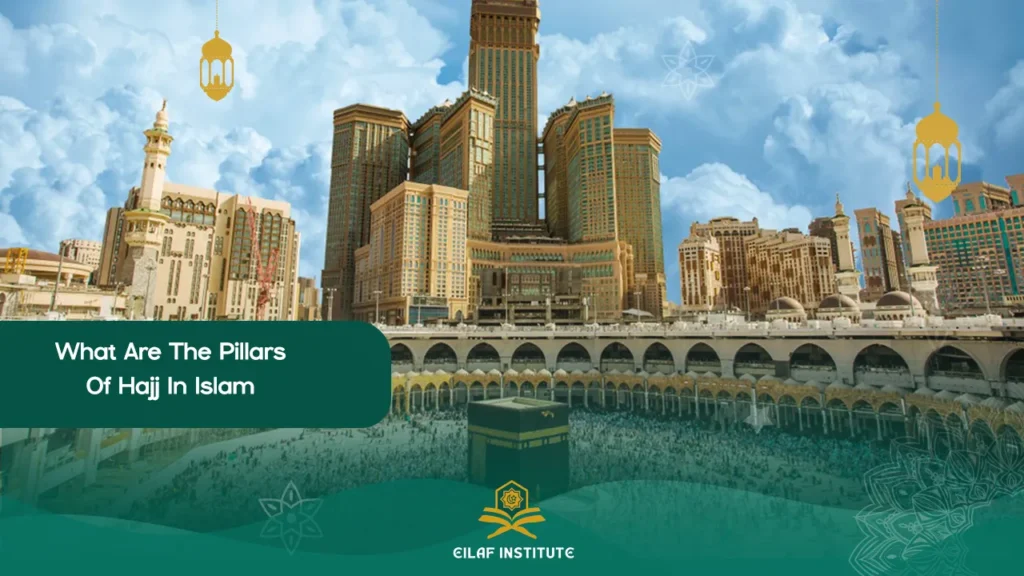Hajj, the sacred pilgrimage to Mecca, is one of the five pillars of Islam hajj refers to. This profound spiritual journey symbolizes unity, submission, and a believer’s devotion to Allah. For a Muslim’s pilgrimage to be valid, they must correctly perform its core components.
Therefore, understanding what are the pillars of Hajj in Islam is the essential first step for any prospective pilgrim. This guide will clearly define the pillars (Arkan) that form the very foundation of Hajj.
What Are The Pillars Of Hajj In Islam?
In Islamic jurisprudence, the pillars of Hajj (also known as Arkan al-Hajj) are the essential, non-negotiable rituals that must be performed for the Hajj to be valid. If a pilgrim misses one of these pillars, their Hajj is rendered incomplete and must be repeated. There is a consensus among scholars that there are four primary hajj pillars.
1. Ihram (The State of Consecration)
Ihram is the first of the pillars of Hajj. It is a sacred state that a pilgrim must enter at a designated station (Miqat) before proceeding to Mecca. This involves:
- Niyyah (Intention): Making a sincere and clear intention in the heart to perform Hajj solely for the sake of Allah.
- Wearing Ihram Garments: For men, this consists of two simple, unstitched white cloths. Women wear modest, regular clothing but must not cover their faces or hands.
- Abstaining from Prohibited Acts: While in Ihram, pilgrims must avoid certain actions like cutting their hair or nails, using perfume, hunting, or engaging in marital relations.
Read also about: the meaning of hajj in islam
2. Wuquf at Arafat (The Standing at Arafat)
This is considered the most crucial of all the arkan hajj. The Prophet Muhammad (peace be upon him) said, “Hajj is Arafat.”
- The Ritual: On the 9th day of Dhul-Hijjah, pilgrims must be present on the plains of Arafat, from noon until sunset.
- The Essence: This time is spent in intense prayer, repentance, and supplication (dua), seeking Allah’s mercy and forgiveness. Missing the Standing at Arafat invalidates the entire Hajj. Answering the question of what are the pillars of Hajj in Islam is incomplete without stressing the importance of this day.
3. Tawaf al-Ifadah (The Circumambulation of Kaaba)
After leaving Arafat, pilgrims perform this essential Tawaf. This is a central hajj pillar that demonstrates the unity of believers revolving around one God.
- The Ritual: Pilgrims circumambulate (walk around) the Kaaba seven times in an anti-clockwise direction.
- The Timing: This Tawaf is performed on the 10th of Dhul-Hijjah after the stoning ritual in Mina. The answer to what are the pillars of Hajj in Islam must include this core act of worship.
4. Sa’i (The Walking between Safa and Marwah)
The final pillar of Hajj is the Sa’i, a brisk walk between the two small hills of Safa and Marwah.
- The Ritual: Pilgrims walk back and forth between Safa and Marwah seven times, starting at Safa and ending at Marwah.
- The Commemoration: This act honors the struggle of Hajar, the wife of Prophet Ibrahim, as she desperately searched for water for her infant son, Isma’il. It is a powerful symbol of perseverance and faith in Allah’s providence.
Starting Your Islamic Learning Journey: islamic studies courses
Who is Obligated to Perform Hajj?
Hajj, the fifth hajj pillar of Islam, is an obligatory duty for every Muslim who meets the following criteria:
- Is a free, adult Muslim of sound mind.
- Possesses the financial means to cover the journey and support their family in their absence.
- Is physically capable of enduring the rigors of the pilgrimage.
- Has safe passage for the journey. (For women, this traditionally includes being accompanied by a Mahram).
Read also about : can i read quran on my period
When is Hajj Performed?
The rituals and pillars of Hajj take place during the Islamic month of Dhul-Hijjah. The main rites occur from the 8th to the 12th or 13th of Dhul-Hijjah, with the Day of Arafat on the 9th being the pinnacle of the pilgrimage. Understanding what are the pillars of Hajj in Islam and their timing is crucial for its correct performance.
At Eilaf Institute, we are dedicated to illuminating the path of knowledge. Whether you are a prospective pilgrim or simply seeking to deepen your understanding of Islam, our resources can help you grasp the profound significance of what are the pillars of Hajj in Islam.

